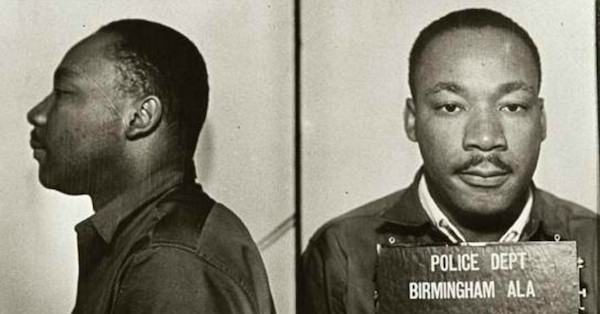Film Review: “MLK/FBI” — A Necessary Cautionary Tale
By Neil Giordano
A powerful document about the persecution of an American icon and the government that tried to destroy him.

A mug shot of Martin Luther King Jr. was taken following his 1963 arrest in Birmingham, Alabama. Photo: Wikimedia Commons.
As we debate who can be counted as a “domestic terrorist” in the United States in the wake of the Capitol insurrection, it’s as apt a time as ever to remember that Martin Luther King Jr. was once considered the “most dangerous” man in America. The robotic genuflections to “I have a dream” and “the content of our character” indulged in by liberals and conservatives alike mask the realpolitik of history: King’s days as a beleaguered activist and enemy of the state. Sam Pollard’s new documentary MLK/FBI scrapes off some of the storybook gloss that’s been spread over King’s career, showing us the man at his most unguarded and vulnerable. More grippingly, the film exposes the federal government’s determined attack on King’s character throughout the ’60s as he rose in stature. The powers-that-be were deeply alarmed by the effectiveness of his evolving political tactics.
Director Ava DuVernay’s Selma artfully used the FBI’s surveillance of King as a suspenseful narrative device. MLK/FBI gives us the full extent of the FBI and federal government’s attempts to spy on and contain King, ranging from the Kennedys and LBJ to the field agents who installed the bugs. Based mainly on David Garrow’s groundbreaking book The FBI and Martin Luther King Jr., Pollard draws on commentary from a series of talking heads, including civil rights activist and politico Andrew Young and former FBI director James Comey. A bevy of historians and Garrow himself also wade in. However, in a style that echoes the great The Black Power Mixtape (2011) (Arts Fuse review), we don’t actually see who is talking until the end of the film, a technique that generates considerable fascination when speakers like Comey and a former FBI field agent are concerned.
Most chillingly, the film illustrates how the FBI’s surveillance mirrored the pathology of J. Edgar Hoover and the paranoid corruption of white “American” values, which tapped into the era’s racial and patriarchal hierarchies. Hoover shifted the goal of FBI spying, unbeknownst to Robert F. Kennedy (who’d originally approved the bugs), to finding evidence of King as a moral deviant. (King’s many romantic affairs were caught on tape.) Hoover set up to exploit the trysts as a way to expose King as an example of the hypersexualized Black male. King’s takedown was about exposing him as the archetypal uncontrollable “beast.”
Indeed, the most compelling parts of the film come in its montage-style edits that accompany the words of the commentators, overlaying clips of stereotypical Black manhood, cartoon illustrations of the biased trope Hoover sought to exploit. Pollard also artfully draws on Hollywood flicks (The FBI Story and Walk a Crooked Mile among them) and other pro–law enforcement propaganda to assemble teams of tall, white, conservative men sworn to uphold the sexual commandments of the homeland. Also effective: stock footage of ’50s white Americana, the Ozzie and Harriet norms that Hoover claimed to idolize. This interwoven imagery suggests how the American public was manipulated, by the government, to be against King and his cause. The man’s life was reduced to what could be shaped out of the recordings: a Black man, a philanderer, an “other” to be shunned. Pollard’s background as an editor serves him well: he expertly dissects the methods of audiovisual manipulation. His work dates back to Bill Duke’s groundbreaking vampire film Ganja and Hess; later he was a producer on the seminal Eyes on the Prize docu-series. More recently he has been involved in a number of Spike Lee’s projects, including the Oscar-nominated documentary Four Little Girls and the Peabody-winning When the Levees Broke.
MLK/FBI does not break new investigative ground, but the film stands as a powerful document detailing the persecution of an American icon and the government that tried to destroy him. Pollard’s approach is both prosaic and poetic; this is a satisfying look back at history that not only supplies the necessary accounting, but serves as a cautionary tale of law enforcement at its worst. A lesson that should be kept in mind given the vicissitudes of Black Lives Matter.
MLK/FBI is showing at the Center for the Arts in Natick, and is available to rent from Amazon and other digital outlets.
Neil Giordano teaches film and creative writing in Newton. His work as an editor, writer, and photographer has appeared in Harper’s, Newsday, Literal Mind, and other publications. Giordano previously was on the original editorial staff of DoubleTake magazine and taught at the Center for Documentary Studies at Duke University.
